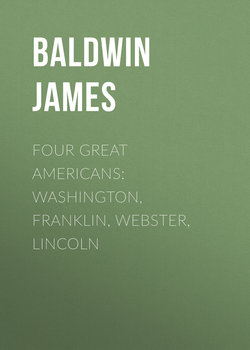Читать книгу Four Great Americans: Washington, Franklin, Webster, Lincoln - Baldwin James - Страница 11
THE STORY OF GEORGE WASHINGTON
THE STORY OF GEORGE WASHINGTON
* * * * *
XI.—THE MUTTERINGS OF THE STORM
ОглавлениеAnd now for several years Washington lived the life of a country gentleman. He had enough to do, taking care of his plantations, hunting foxes with his sport-loving neighbors, and sitting for a part of each year in the House of Burgesses at Williamsburg.
He was a tall man—more than six feet in height. He had a commanding presence and a noble air, which plainly said: "This is no common man."
He was shrewd in business. He was the best horseman and the best walker in Virginia. And no man knew more about farming than he.
And so the years passed pleasantly enough at Mount Vernon, and there were few who dreamed of the great events and changes that were soon to take place.
King George the Third of England, who was the ruler of the thirteen colonies, had done many unwise things.
He had made laws forbidding the colonists from trading with other countries than his own.
He would not let them build factories to weave their wool and flax into cloth.
He wanted to force them to buy all their goods in England, and to send their corn and tobacco and cotton there to pay for them.
And now after the long war with France he wanted to make the colonists pay heavy taxes in order to meet the expenses of that war.
They must not drink a cup of tea without first paying tax on it; they must not sign a deed or a note without first buying stamped paper on which to write it.
In every colony there was great excitement on account of the tea tax and the stamp act, as it was called.
In the House of Burgesses at Williamsburg, a young man, whose name was Patrick Henry, made a famous speech in which he declared that the king had no right to tax them without their consent.
George Washington heard that speech, and gave it his approval.
Not long afterward, news came that in Boston a ship-load of tea had been thrown into the sea by the colonists. Rather than pay the tax upon it, they would drink no tea.
Then, a little later, still other news came. The king had closed the port of Boston, and would not allow any ships to come in or go out.
More than this, he had sent over a body of soldiers, and had quartered them in Boston in order to keep the people in subjection.
The whole country was aroused now. What did this mean? Did the king intend to take away from the colonists all the liberties that are so dear to men?
The colonies must unite and agree upon doing something to protect themselves and preserve their freedom. In order to do this each colony was asked to send delegates to Philadelphia to talk over the matter and see what would be the best thing to do.
George Washington was one of the delegates from Virginia.
Before starting he made a great speech in the House of Burgesses. "If necessary, I will raise a thousand men," he said, "subsist them at my own expense, and march them to the relief of Boston."
But the time for marching to Boston had not quite come.
The delegates from the different colonies met in Carpenter's Hall, in Philadelphia, on the 5th of September, 1774. Their meeting has since been known as the First Continental Congress of America.
For fifty-one days those wise, thoughtful men discussed the great question that had brought them together. What could the colonists do to escape the oppressive laws that the King of England was trying to force upon them?
Many powerful speeches were made, but George Washington sat silent. He was a doer rather than a talker.
At last the Congress decided to send an address to the king to remind him of the rights of the colonists, and humbly beg that he would not enforce his unjust laws.
And then, when all had been done that could be done, Washington went back to his home at Mount Vernon, to his family and his friends, his big plantations, his fox-hunting, and his pleasant life as a country gentleman.
But he knew as well as any man that more serious work was near at hand.
* * * * *
